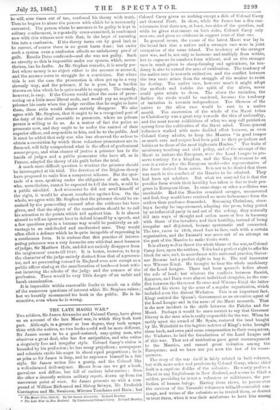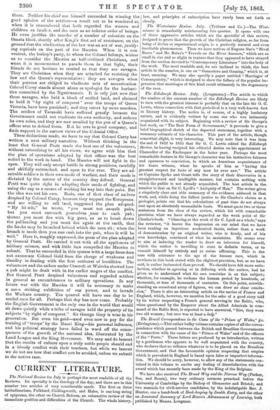THE LATE MAORI WAR."' Two soldiers, Sir James Alexander and
Colonel Carey, have given us an account of the late Maori war, in which they both took part. Although, in a greater or less degree, they both sympa- thize with the natives, no two books could well be more different. Sir James seems to be a good-natured, easy-going man, who observes a great deal, who has few antipathies, and who writes a singularly free and irregular style. Colonel Carey's vision is bounded by his profession ; he has many prejudices ; newspapers and colonists excite his anger in about equal proportions ; he is as prim as Sir James is limp, and he expresses himself in a fair style. Sir James writes like a gossip, and the Colonel like a well-educated drill-serjeaut. Hence from one we get a book, garrulous and diffuse, but full of curious information ; from the other a decently written military report, drawn up horn the narrowest point of view. Sir James presents us with a com- pound of William Richmond and Bishop Selwyn, Mr. Frederick Carrington and Mr. Swainson, Wiremu.Tanaihana and lhaia ; but
• The Maori War, 1800-61. By Sir James Alexander. Richard Bentley.
• The Late War in New Zealand. By Lieutenant-Colonel Carey. Richard Bentley. Colonel Carey gives us nothing except a dish of Colonel Carey anti General Pratt. In short, while Sir James has a dim con- sciousness that there are, at least, Ova sides of the question, and while he gives statements on both sides, Colonel Carey only sees one, and gives no evidence in support even of that one.
It is all very well to throw the whole blame of the war, as Colonel Carey does, upon the settlers. Teira had a perfect right to offer his block for sale, and, in accordance with universal practice, Gover- nor Browne had a perfect right to buy it. The real innovator was Wiramu Kingi. He brought to bear the whole machinery of the Land League. There had been quarrels before about the sale of land; but whereas the conflicts between Rawiri, Katatore, and Maia were almost individual strugeles, in the con- flict between the Governor Browne and Wiremu Kingi the latter enforced his views by the arms of a regular organization, which included even the distant Waikatos. This is an important fact. Kingi resisted the Queen's Government as an executive agent of the Land League and in the name of the Maori monarch. That is the new incident in the strife between the Pakeha and the Maori. Perhaps it would be more correct to say that Governor Fitzroy is the man who is really responsible for the war. When he rashly upset the awatd of Mr. Spain, restored the land bought by Mr. Wakefield to the fugitive natives of Kingi's tribe, brought them back, and even paid some compensation to their conquerors, the Waikatos, lie laid the .foundations of the.Land League and of this war. That act of restitution gave great encouragement to the Maories, and caused great irritation among the Europeans; and we have not yet seen the last of its conse- quences.
The story of the war itself is fairly related in both volumes, but with more order and precision by Colonel Carey, whose chief fault is a captious dislike of the colonists. He vastly prefers a Maori to any Englishman in New Zealand, and seems to think a soldier, providing lie is not a volunteer or militiaman, the per- fection of human beings. Having these views, he passes over the services of the Taranaki volunteers witheill-concealed con- tempt, and writes of the colonists as he treated them, or desired to treat them, when it was their misfortune to have him among
them. Neither his chief nor himself succeeded in winning the gool opinion of the settlers—a result not to be wondered at, when it is remembered that both regarded the women and children as lumb2r, and the men as an inferior order of beings. He oven justifies tha murder of a number of colonists on the Omuta block, shortly after Kingi's first act of resistance, on the ground that the vindication of the law was an act of war, justify- ing reprisals on the part of the Maories. When it is con- venient, the bishop's party, to whom the Colonel belongs, wishes us to consider the Maories as half-civilized Christians, and when it is inconvenient to parade them in that light, their friends do not hesitate to remind us that they are savages.
They are Christians when they are attacked for resisting the Jaw and the Queen's representative ; they are savages when their patrons are obliged to vindicate acts of assassination.
Colonel Carey stands almost alone as apologist for the barbari- ties committed by the Ngatiruanuis. It is only just now that these savages, who held a block of settled land, and claimed to bold it "by right of conquest" over the troops of Queen Victoria, have been punished ; and they retort by more murders. The settlers of Taranaki have suffered greatly because the Government could not vindicate its own authority, and enforce its own rules, and they are now assailed by the pen of a Queen's officer sent to defend them. Bat he errs in good company, and finds support in the narrow views of the Colonial Office.































 Previous page
Previous page